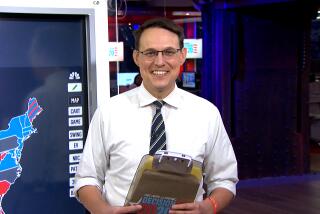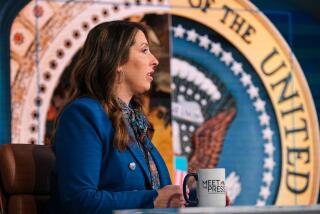News Division: Sources and Paid Consultants
- Share via
CBS has former Defense Secretary William S. Cohen, while NBC boasts former Army Gen. and anti-drug czar Barry McCaffrey. CNN relies on retired Air Force Gen. Don Shepperd and former NATO Supreme Allied Commander Wesley Clark.
The list of notables goes on, news division by news division. In calmer times, these people are known as sources, the kind of informed observers who can shed light on noteworthy developments. During a crisis, they are transformed into paid consultants.
But the distinction is not always readily apparent. And the practice, which has gained new momentum in recent weeks, appears to bump up against long-standing network policies barring payments to people who are interviewed.
“What’s the difference? You can’t pay a source. You can pay a consultant,” says Reese Schonfeld, the former president of CNN. He was a pioneer in arranging some of the first consultantships but now says he’s troubled by the hirings. “They’re legitimate news sources. They should answer questions for everybody.”
To understand why broadcasters have embraced this system of paid experts, it helps to talk to Judy Milestone, the senior vice president responsible for network booking across seven CNN channels. On any given day, her team has to arrange for 100 guests to be interviewed. On “fast days,” when news keeps breaking, that figure jumps to 150. Since Sept. 11, every day has been a fast day.
She says that it’s only fair for broadcasters to pay consultants for appearing exclusively on their shows, particularly when they are on call 24 hours a day. Consultants such as Clark, with their rich military pedigree, can help to explain the challenges facing bombers and ground troops in Central Asia. Many prominent analysts are grateful to respond to a single media organization’s needs as a way of winnowing through myriad requests for interviews.
“A source is someone who you talk to periodically, who gives you intellectual guidance and story guidance,” Milestone says. In contrast, she says, a consultant “has the ability to explain to a mass audience what may, or may not, be happening.” That in-house observer can also help to educate reporters and producers about tricky technical issues.
Marcy McGinnis, the senior vice president of news coverage for CBS, says consultants are not journalists, but they’re also not sources. “I see them as staff workers,” she says. “That’s different than Mike Wallace saying to someone, ‘Hey, come on “60 Minutes,” and I’ll pay you if you tell us how you killed your mother.”’
Yet it’s not always clear why one commentator is a consultant and another isn’t. For example, ABC interviewed bioterrorism authority Barnett Rubin and prominent Pakistani journalist Rahimullah Yusufzai, both of whom are paid consultants, along with retired Army Lt. Col. Ralph Peters, who is not.
There also are concerns among journalists that many recently retired government and military figures pressed into employment as analysts retain tight links to leaders in their former agencies. Even those who do not appear partisan in the strict sense may have loyalties to a branch of the armed forces or a camp within administration bureaucracies that may be advancing specific policies.
“It is a really close, potentially incestuous relationship, and yet there’s no way around it,” says Tom Bettag, executive producer of ABC News’ “Nightline.” “You really are hiring people for their very specific expertise.” But, he says, as long as networks disclose their arrangements, the viewer is better served by hearing such experts.
Schonfeld, who was involved in hiring a former military officer back in the early 1980s to comment on the Falkland Island conflict, isn’t so sure. “It gets to the line where the Brits pay people to be interviewed,” he says.
More to Read
The biggest entertainment stories
Get our big stories about Hollywood, film, television, music, arts, culture and more right in your inbox as soon as they publish.
You may occasionally receive promotional content from the Los Angeles Times.










